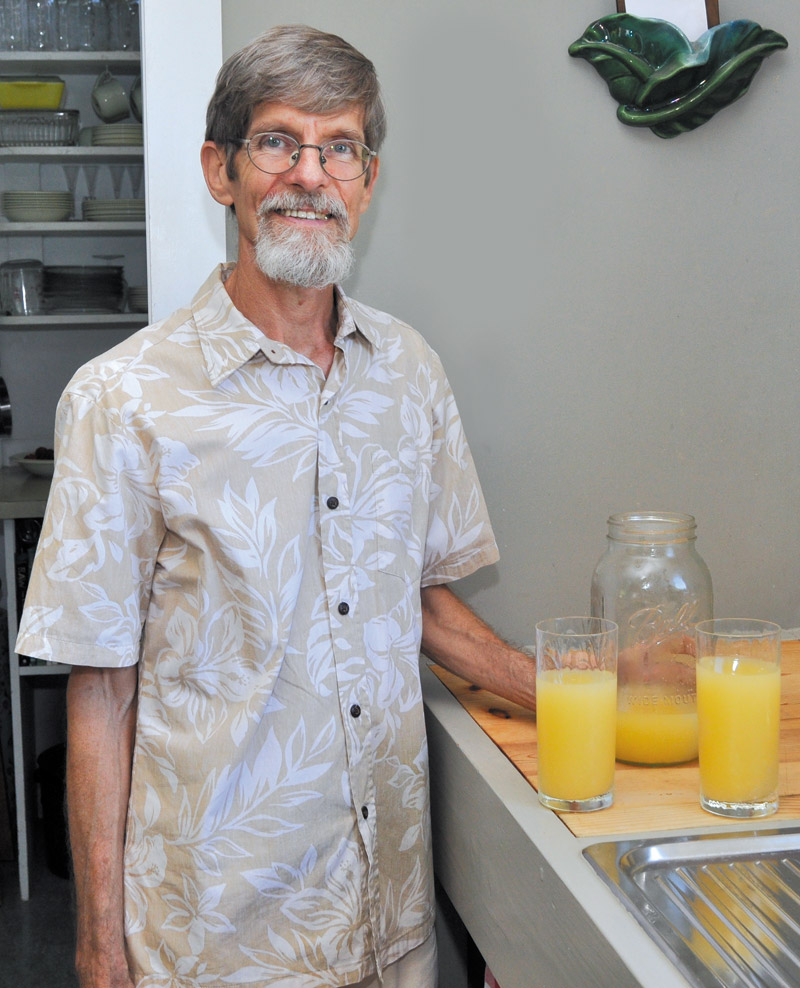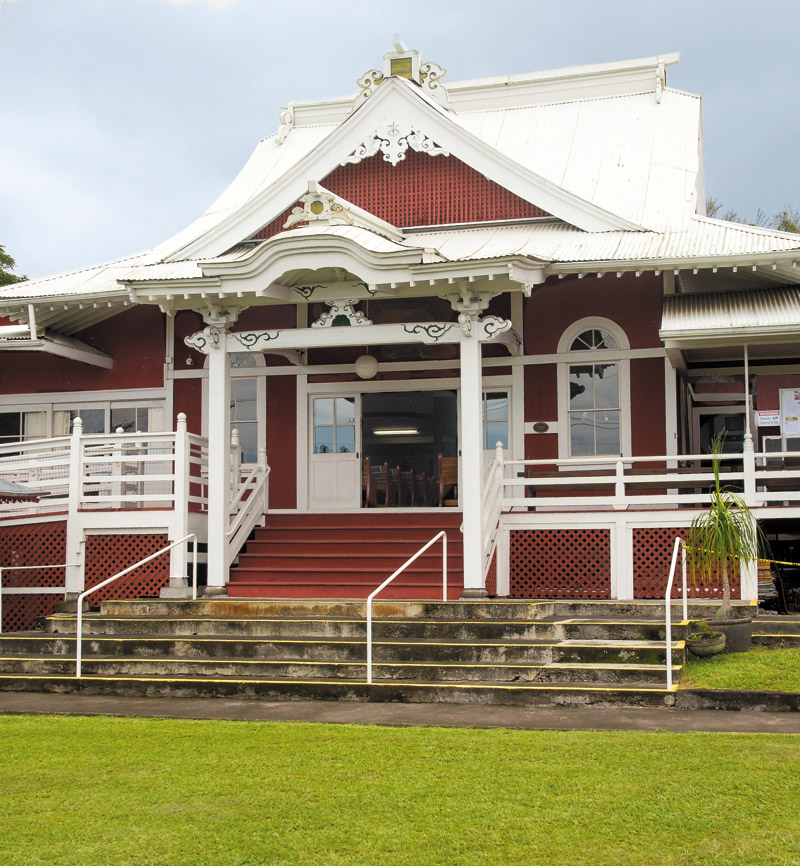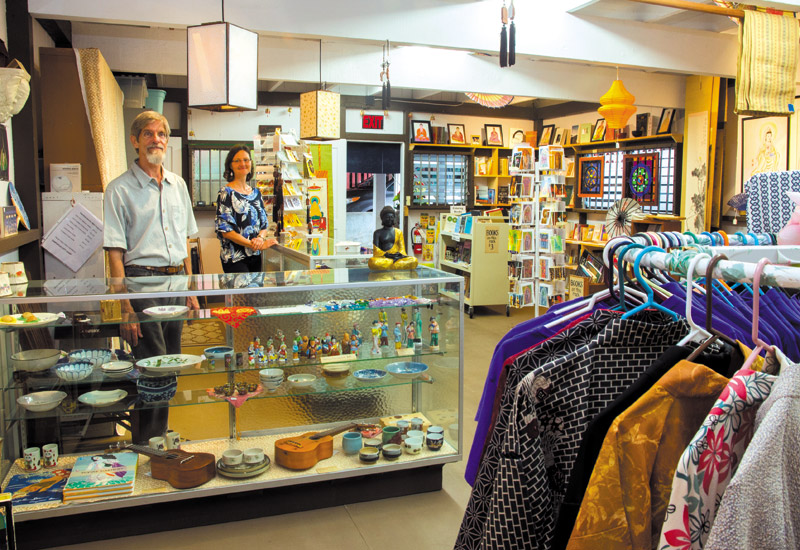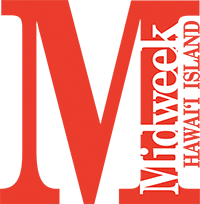It’s Crystal Clear

Clear Englebert lives on an organic farm in Captain Cook teeming with citrus and produce.
The power of feng shui is evident to author Clear Englebert, who has seen the practice transform lives for the past three decades.
The ancient Chinese art of feng shui is a widely hailed practice that helps people to live in harmony and balance with their personal environment. Here in Hawai‘i, the go-to source for feng shui consultation is Captain Cook resident Clear Englebert.
The author of six bestselling books about feng shui, Englebert has helped residents and business owners achieve positive transformation in relationships, finances, health, well-being and more. His seminal book, Feng Shui for Hawai‘i, applies feng shui principles specifically to the island lifestyle. His most recent book, Feng Shui for Love & Money shows readers how to stimulate prosperity and enhance relationships simply by creating optimal energy flow, or “chi,” throughout your immediate surroundings.

Founded in 1914, Daifukuji Soto Mission is located in Honalo, Kona.
“I wouldn’t still be doing this for 30 years if I haven’t been consistently, truly personally amazed by the tangible results I see every day,” says Englebert. “The positive feedback from clients is what keeps me going. There is a huge personal satisfaction in helping people transform their lives.”
Englebert says there are several issues that commonly plague homes in Hawai‘i, especially those located on the makai (ocean) side of the street where a straight line leads from the front door to the back door looking directly out to the ocean. In the world of feng shui, the better approach is a meandering path that enriches the home and keeps the positive energy circulating. Conversely, a straight path leading to the front door summons a burst of too much energy to the entrance.

Feng shui expert Clear Englebert (left) curates and co-manages the nonprofit gift shop at Daifukuji Soto Mission in Kona.
What to do if you can’t alter the architectural components of your home or office? Feng shui offers many symbolic fixes that can counteract the dissipated energy.
“You can hang a clear, faceted crystal in line with both doors to symbolically redirect the energy,” says Englebert. “Another remedy is to place a mirror facing into the house at the back door, which pushes the energy back into the home rather than letting it zoom out.”
Indeed, feng shui solutions don’t have to be expensive or involve purchasing anything new. Englebert enjoys advising people on a limited budget how to work with the things they already own. It’s not about having beautiful furnishings and accessories, he notes, it’s about the arrangement, placement and compatibility of objects in and outside of the home and in the garden, too.

Simple and practical, Englebert’s own kitchen in Captain Cook demonstrates many feng shui principles.
Problem areas not easily fixed can be addressed by symbolically applying a small red dot of fingernail polish to a crack in the window that can’t be repaired, for example, or in a pothole in the driveway that is metaphorically blocking your path forward. The color red represents fresh blood and new beginnings.
“I know a woman on the Kona side whose road to her house was full of potholes and causing her great distress,” he recalls. “She put a red dot in every puka on her driveway. Good things happened very fast. Large amounts of money came in, and even her landlord below her received a windfall. It was incredible.”
Lately, Englebert has been advising real estate professionals on how to utilize feng shui during transactions.
A recent seminar on O‘ahu included tips for buyers, sellers and agents, such as what a buyer should know before purchasing a home, and what a seller should know if they are interested in using feng shui to better move a property.
“Before any transaction takes place, both the potential buyer and the seller should understand where the wealth corner of the home is located, and where the relationship corner is, as well,” Englebert says. “When a place is for sale, the most important relationship is between the buyer and the seller. Feng shui staging can be successful even in a bare home.”
This last year, Englebert has focused most of his time volunteering at historic Daifukuji Soto Mission in Honalo. Having owned three bookstores in the past, Englebert knew exactly how to transform the temple’s old musty basement into a beautiful, nonprofit book/gift store brimming with art, treasures, sculptures, apparel, altar items, new and used books, and fantastic finds. Located beneath the temple, the basement originally served as a Japanese school before and after WWII, and then became a meeting space for the Boy Scouts and the Young Buddhist Association before evolving into an old storage space in recent years.
Of course, Englebert brought feng shui principles to the space, which required new paint on all the surfaces and the addition of glass display cases, shelves and antique furnishings.
“We chose a trim color that perfectly matches a beautiful antique bench from an old temple in Japan,” he says. “Being in this store is like being inside a jewelry box.”
Englebert curated the impressive inventory of Zen books thanks in part to his background as Zen Buddhist monk in the ’80s and ’90s at Shasta Abbey in Northern California.
Managing the gift store with fellow volunteer Barb Bosz has been a labor of love.
“We are blessed to have Rev. Jiko Nakade and many wonderful congregants here,” he says. “This is a nonprofit store for the temple. I’m proud of this little shop. I think people who know about Buddhism will appreciate how thoughtful our selection of books is.”
The gift store is currently open on Wednesdays and Thursdays from 10 a.m. to 2 p.m., and on Fridays from 10 a.m. to 1 p.m. The complete schedule is listed online at daifukuji.org.
For information about Engle-bert’s feng shui consultation and books, visit fungshway.com.

